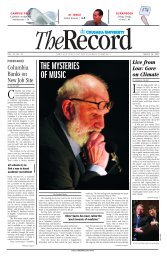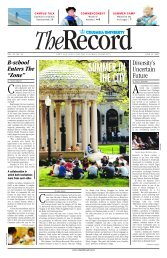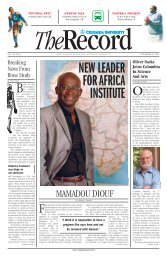January 31, 2011 - Columbia News - Columbia University
January 31, 2011 - Columbia News - Columbia University
January 31, 2011 - Columbia News - Columbia University
You also want an ePaper? Increase the reach of your titles
YUMPU automatically turns print PDFs into web optimized ePapers that Google loves.
6 january <strong>31</strong>, <strong>2011</strong><br />
New Mobile “App” Provides Earth Science Data<br />
new mobile application<br />
A created at Lamont-Doherty<br />
Earth Observatory provides users<br />
with simplified access to<br />
vast libraries of images and<br />
information that until now<br />
were tapped mainly by earth<br />
and environmental scientists.<br />
The EarthObserver<br />
App, for the iPhone, iPad or iPod<br />
<strong>University</strong> Launches Updated Website<br />
After months of public testing and<br />
user feedback, the revised and redesigned<br />
<strong>Columbia</strong>.edu home page was<br />
launched on Jan. 13. Designed by the<br />
Office of Communications and Public<br />
Affairs, in partnership with <strong>Columbia</strong><br />
<strong>University</strong> Information Technology, it<br />
Touch, displays natural features<br />
and forces on land, undersea<br />
and in the air. The application<br />
draws on dozens of<br />
frequently updated databases<br />
from institutions throughout<br />
the world. For a slideshow of<br />
images available through the<br />
application, visit: news.columbia.edu/earthapp.<br />
contains a number of aesthetic, organizational<br />
and technological improvements,<br />
including simplified navigation; an enhanced<br />
search function that includes<br />
websites and contact information; and<br />
social media tools. To see more go to:<br />
news.columbia.edu/home/2266<br />
eileen barroso<br />
TheRecord<br />
Four Professors Elected Fellows of the American<br />
Association for the Advancement of Science<br />
By Record Staff<br />
Four <strong>Columbia</strong> <strong>University</strong> professors have been<br />
elected fellows of the American Association for<br />
the Advancement of Science (AAAS), a prestigious<br />
scientific society<br />
established in 1848.<br />
The new fellows,<br />
selected from across a<br />
range of fields including<br />
political science,<br />
biology and epidemiology,<br />
are among 503 inductees<br />
from across the<br />
nation. Last year the<br />
AAAS recognized seven<br />
<strong>Columbia</strong> professors as new fellows.<br />
Here are this year’s fellows:<br />
Wallace S. Broecker<br />
Wallace S. Broecker, Newberry Professor of<br />
Geology in the Department of Earth and Environmental<br />
Science, for pioneering contributions to the<br />
fields of climate science<br />
and oceanography.<br />
Broecker, who is<br />
also a researcher at<br />
the Lamont-Doherty<br />
Earth Observatory, was<br />
recognized for his understanding<br />
of glacial<br />
ages, circulation of the<br />
ocean and ocean biogeochemistry.<br />
Shih-Fu Chang<br />
Shih-Fu Chang, professor and department chair<br />
of Electrical Engineering at the School of Engineering<br />
and Applied Science (SEAS), for distinguished<br />
contributions to multimedia content analysis and<br />
Bruce Gilbert<br />
Dr. Cheryl Hutt<br />
search. Since the early 1990s, his research group<br />
has developed numerous popular visual search engines<br />
and intelligent multimedia communication<br />
systems.<br />
Peter Schlosser, Vinton<br />
Professor of Earth and Environmental<br />
Engineering<br />
at SEAS, for his important<br />
scientific accomplishments<br />
in ocean and hydrological<br />
sciences. Schlosser, who is<br />
also the director of the <strong>Columbia</strong><br />
Climate Center, was<br />
recognized for his contributions<br />
to sustainable development<br />
and his significant<br />
services to national and international scientific<br />
communities.<br />
Saul J. Silverstein, professor of microbiology<br />
and immunology at <strong>Columbia</strong>’s College of Physicians<br />
and Surgeons, for<br />
Saul J. Silverstein<br />
Peter Schlosser<br />
distinguished contributions<br />
to the field of biology<br />
and medical sciences.<br />
In particular, Silverstein<br />
was recognized for development<br />
of the process<br />
of cotransformation of<br />
mammalian cells, which<br />
allows foreign DNA to be<br />
inserted into a host cell to<br />
produce certain proteins.<br />
New fellows will be<br />
presented with an official certificate and a gold and<br />
blue (representing science and engineering, respectively)<br />
rosette pin on Feb. 19 during the <strong>2011</strong> AAAS<br />
annual meeting in Washington, D.C.<br />
Bruce Gilbert<br />
<strong>Columbia</strong> Staffer and Veteran Invited to President’s DADT Signing<br />
eileen barroso<br />
Domi in her office in Low Library.<br />
By Melanie Farmer<br />
Former U. S. Army Captain Tanya<br />
Domi could not believe her good<br />
fortune when she was invited to attend<br />
President Barack Obama’s signing of<br />
legislation to repeal the “don’t ask, don’t<br />
tell” policy banning gays and lesbians from<br />
serving openly in the military. For Domi,<br />
one of just 500 guests at the Dec. 22 ceremony<br />
in Washington, D.C., it struck very<br />
close to home.<br />
Domi, a senior public affairs officer in<br />
the Office of Communications and Public<br />
Affairs as well as an adjunct assistant professor<br />
of International and Public Affairs, had<br />
been investigated for her sexual orientation<br />
soon after enlisting in the Army.<br />
“It was surreal,” Domi says about the bill<br />
signing. “It’s amazing to go from being in<br />
the Army and being read my rights to standing<br />
in the Department of Interior listening<br />
to the president say, ‘We are not a don’t ask,<br />
don’t tell country.’”<br />
Domi, 56, enlisted in the Army in 1974,<br />
when she was 19. Six months after enlisting,<br />
she was accused of being a lesbian after going<br />
to a gay bar with other women from her company;<br />
all were privates stationed at Fort Devens,<br />
Mass. After an 18-month investigation,<br />
some women who had revealed they were gay<br />
were discharged from the Army.<br />
Domi retained counsel from the American<br />
Civil Liberties Union and refused to reveal her<br />
sexual orientation. She fought the charges,<br />
which were ultimately dropped, but the Army<br />
downgraded Domi’s top secret clearance and<br />
she was not permitted to participate in her<br />
graduation from military intelligence training.<br />
While she is now openly gay, she wasn’t at<br />
the time, and she was investigated twice more<br />
and, she says, sexually harassed by a colleague.<br />
Domi ultimately achieved the rank of captain<br />
before resigning her commission in 1990.<br />
“It was really dangerous for me to remain in<br />
the Army even though I loved the Army,” says<br />
Domi. When the “don’t ask, don’t tell” policy<br />
became law in 1993, she worked to repeal<br />
it, testifying before Congress and speaking<br />
against it in 25 states.<br />
“The repeal legitimizes those who want<br />
to serve, who happen to be gay and lesbian,<br />
and want to be treated like everyone else in<br />
America. These values are quintessentially<br />
American,” Domi says.<br />
Born and raised in Indianapolis in a politically<br />
minded family, Domi was introduced to<br />
politics by her mother, who often volunteered<br />
as a judge at polling stations. At 13, she canvassed<br />
door-to-door for Robert F. Kennedy’s<br />
1968 presidential bid.<br />
Following her military service, working<br />
in politics seemed like a natural move. She<br />
worked in a series of political public relations<br />
and communications jobs, including for the<br />
House Armed Services Committee, the Clinton-Gore<br />
1996 re-election campaign and the<br />
Organization for Cooperation and Security<br />
in Europe in Bosnia-Herzegovina, where she<br />
helped implement the Dayton Peace Accords.<br />
In 2000, after a decade of working on issues<br />
such as sex trafficking, human rights and media<br />
freedom, often in the international arena,<br />
she moved to New York City to get a master’s<br />
degree in human rights at <strong>Columbia</strong>. Eventually<br />
she joined the public affairs office. After<br />
earning her degree in 2007, she also began<br />
teaching human rights as an adjunct professor<br />
of international affairs.<br />
Domi’s job includes promoting <strong>Columbia</strong>’s<br />
expertise in international affairs, politics and<br />
economics, including the School of International<br />
and Public Affairs and the <strong>University</strong>’s<br />
six regional institutes. She also serves as the<br />
primary press contact for all World Leaders<br />
Forum events, which have brought prominent<br />
political and global figures to campus.<br />
Domi says she never imagined a career in<br />
education but now she’s hooked. “I enjoy the<br />
intellectual stimulus of talking to all these brilliant<br />
people and listening to how they view<br />
the world,” she says. “I absolutely love it. I’m<br />
always learning something new.”<br />
Col. Harold Floody nominated Domi, then 35, for the Douglas MacArthur Leadership Award in 1989 as the top junior officer in the U.S.<br />
Army Support Command, Hawaii.






